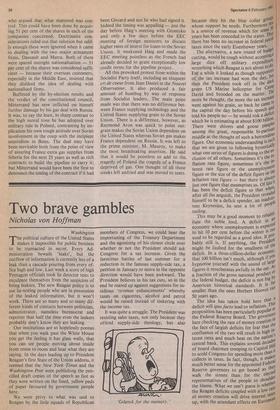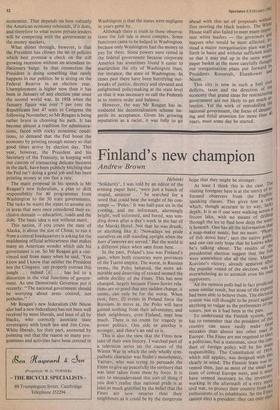Two brave gambles
Nicholas von Hoffman
Washington The political culture of the United States makes it impossible for public business to be transacted in secret. Every Ad- ministration bewails 'leaks', but the outflow of information is currently less of a leak than a cascade pouring from every of- fice high and low. Last week a score of high Pentagon officials took lie detector tests to exculpate themselves from the suspicion of being leakers. The new Reagan policy is to use lie-testing people whe are in possession of the leaked information, but it won't work. There are so many and so many dif- ferent kinds of contacts between politician, administrator, nameless bureaucrat and reporter that half the time even the leakers probably don't know they are leaking.
Our institutions are so hopelessly porous that when you walk past the White House you get the feeling it has glass walls, that you can see people moving about inside from room to room and hear what they are saying. In the days leading up to President Reagan's first State of the Union address, it seemed that the New York Times and the Washington Post were publishing the pen- cilled draft copies of the speech as fast as they were written on the lined, yellow pads of paper favoured by government people here.
We were privy to what was said to Reagan by the little squads of Republican members of Congress, we could hear the importuning of the Treasury Department and the agonising of his closest circle over whether or not the President should ask Congress for a tax increase. Given the ferocious battles of last summer for a reduction in the famous supply-side tax, a petition in January to move in the opposite direction would have been awkward. The President believes in his tax cuts, so in the end he reared up against suggestions for in- sidious 'revenue enhancements' whereby taxes on cigarettes, alcohol and petrol would be raised instead of tinkering with the income tax.
It was quite a struggle. The President was resisting sales taxes, not only because they offend supply-side theology, but also
because they hit the blue collar groups whose support he needs. Furthermore this is a source of revenue which for some 3vA years has been conceded to the states. Thus there has been no increase in federal pen° 1 taxes since the early Eisenhower years. The alternative, a new round of budget cutting, would be tough without accepting° large slice off military expenditure, something which Reagan is not about to d°1 For a while it looked as though suPPorter;• of the tax increase had won the day, u1„, then the President took off in the dar' green US Marine helicopter for COP David and brooded on the matter. The more he thought, the more the tax increase went against his grain, so back he carne ta the capital the day before his speech an, told his people no — he would risk a deficit which he is estimating at about $100 billion. There were shivers and goose Pines among the great, responsible bi-partisan middle at the thought of such a horrendous figure. Our economic understanding is such , that we are given to following hysterically what one series of figures is doing to the ex elusion of all others. Sometimes it's the nl" flation rate figure, sometimes it's the 111; terest rate figure or the unemploYme„ figure or the size of the deficit figure or tir" inflation rate figure — but there is alvia):s Just one figure that mesmerises us. Of late tt has been the deficit figure so that when' after all the anguish, the President revealed himself to be a deficit spender, an inadvef; tent Keynesian, he sent a lot of people reeling. This may be a good moment to rehahil" itate the noble lord. A deficit in art economy where unemployment is expected to hit 10 per cent before the winter is out used to be regarded as a good idea. It PI1°- bably still is. If anything, the President might be faulted for the smallness of the deficit. In a three-trillion-dollar economy' that 100 billion isn't much, although if 31°' hypnotise yourself with the sound of large figures it reverberates awfully in the eat. As a fraction of the gross national product or the federal budget, the deficit is not big bti American historical standards. It is far smaller than the ones Herbert Hoover
50 years ago.
The idea has taken hold here thnt,..° deficit will ipso facto lead to inflation. TPI-1, proposition has been particularly popular at , the Federal Reserve Board. The governors hate checking the rate of money creation nt the face of largish deficits for fear that the confluence of the two will result in high la,' terest rates and much heat on the nation s central bank. This explains several deca_cl,e4 of board chairmen trooping to Capitol 1-11., to scold Congress for spending more than collects in taxes. In fact, though, it makes i much better sense for the appointed Federal Reserve governors to get booed as they walk the streets than for the elected representatives of the people to shoulder the blame. What we can't guess is whether the Reagan deficits coupled with a low rate of money creation will drive interest rates up, with the attendant effects on EuroPe4''
economies. That depends on how robustly the American economy rebounds, if it does, and therefore to what extent private lenders will be competing with the government in the money markets.
What shines through, however, is that the President has chosen the set of policies which best promise a check on the still growing recession without an attendant in- flationary bulge. In that connection the President is doing something that rarely happens in our politics: he is sitting on the Federal Reserve in an election year. Unemployment is higher now than it has been in January of any election year since the second world war. In 1958 when the January figure was over 7 per cent the Republicans lost 47 seats in Congress the following November; so Mr Reagan is being rather brave in choosing his path. It has become almost a tradition for administra- tions, faced with rocky economic condi- tions, to demand that the Fed boost the economy by printing enough money so that good times arrive by election day. This year, however, the President and his Secretary of the Treasury, in keeping with our custom of transacting delicate business in the dark, have been publicly bitching that the Fed isn't doing a good job and has been printing money at too fast a rate.
The main proposal in his speech is Mr Reagan's new federalism, a plan to shift responsibility for 40 programmes from Washington to the 50 state governments. The tasks he wants the states to assume are in areas that were once considered their ex- clusive domain — education, roads and the dole. The basic idea is not without merit.
This nation, if you count the state of Alaska, is about the size of China; to run it from a central headquarters is asking for the maddening official arbitrariness that makes many an American wonder which side his government is on. So Mr Reagan got a con- vinced nod from many when he said, 'You know and I know that neither the President nor the Congress can properly oversee this jungle . . . indeed [it] . . . has led to a distortion in the vital functions of govern- ment. As one Democratic Governor put it recently: "The national government should be worrying about arms control, not potholes." ' Mr Reagan's new federalism (Mr Nixon also had a new federalism) has not been well received by most liberals, and least of all by blacks, who correctly associate state sovereignty with lynch law and Jim Crow. White liberals, for their part, answered by pointing out that the reason so many pro- grammes and activities have been centred in Washington is that the states were negligent in years gone by.
Although there is truth in those observa- tions the full tale is more complex. Some functions came to be lodged in Washington because only Washington had the money to pay for them. Some powers were vested in the federal government because corporate America has sometimes found it easier to manipulate the city of Washington than, for instance, the state of Washington. In times past there have been horrifying out- breaks of justice, decency and elevated and enlightened policymaking at the state level so that it was necessary to call the Federals in to restore order and balance.
However, the way Mr Reagan has in- troduced his decentralisation scheme im- perils its acceptance. Given his growing reputation as a racist, it was folly to go
ahead with this set of proposals without first meeting the black leaders. The White House staff also failed to meet many irnpor: tant white leaders — the governors and mayors who would be most affected. In" stead a major reorganisation plan was Put forth in haste and without sufficient studY so that it may end up in the same waste- paper basket as the more carefully thought out reorganisation plans put forward by Presidents Roosevelt, Eisenhower and Nixon. This city is now in such a boil over deficits, taxes and the direction of the economy that grand ideas for restructuring government are not likely to get much at- tention. Yet the work of remodelling the national government, .the focus of despair" ing and fitful attention for more than 4u years, must some day be started.

























 Previous page
Previous page